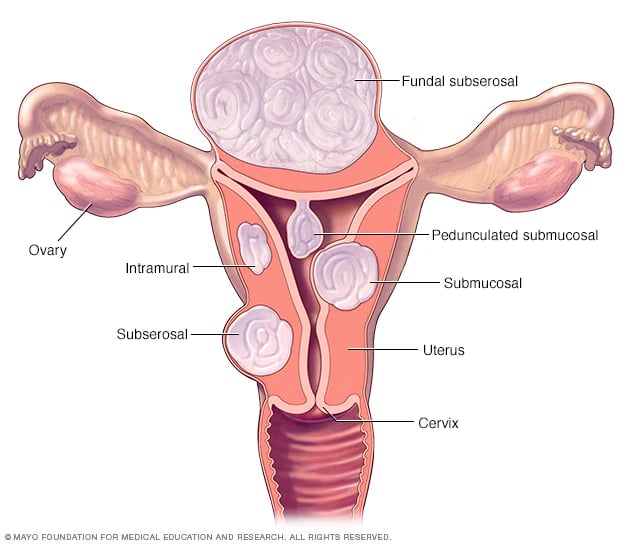When it comes to managing the symptoms of fibroids, as well as reducing your risk of them developing in the first place, your diet can have a significant impact.
Eating a healthy diet rich in fruits, vegetables, whole grains, and lean protein, and low in fat, sugar, and alcohol, may help to reduce the risk of fibroids or manage their symptoms. On the other hand, consuming a diet high in red meat, processed foods, and caffeine may increase the risk of fibroids or worsen their symptoms.
Additionally, maintaining a healthy weight and avoiding obesity may also help with fibroid management. However, it's important to note that diet alone is unlikely to cure fibroids, and a comprehensive approach that includes medical treatment, lifestyle changes, and alternative therapies may be necessary for optimal management.
In this blog, we’ll be covering the topic of fibroids and diet, as well as the role of exercise and body weight, in detail.
What are Uterine Fibroids?
Uterine fibroids are noncancerous (benign) growths that develop in or on the uterus. They are also known as leiomyomas or myomas. Fibroids can vary in size and number and can be located inside the uterus, on its outer surface, or attached to it by a stalk.

They are made of smooth muscle and fibrous tissue and can cause symptoms such as heavy or prolonged menstrual periods, abdominal pain or pressure, frequent urination, and back pain. Some women with fibroids do not experience any symptoms, while others may experience significant discomfort.
The exact cause of fibroids is unknown, but hormonal imbalances, genetics, and lifestyle factors are believed to play a role in their development.
Impact of Diet on Fibroids
Before we dive into the specifics of what foods to eat and which ones to avoid, let’s first quickly look at what the research into fibroids and diet has found.
A 2021 study looked at the existing research around fibroids and diet in an effort to summarise the data and improve the reporting of findings. As the authors of the study noted, their “review of the literature led to these conclusions: a low intake of fruit and green vegetables is linked to a higher risk of myoma formation; vitamin D deficiency is associated with an increased risk for uterine myoma onset; pollutants ingested with food increase uterine myoma risk.”
What Foods Can Help With Fibroids?
There are several foods that may help with the management of fibroids. These include:
- Fruits and vegetables: Consuming a diet rich in fruits and vegetables, especially leafy greens, may help to regulate hormones and reduce inflammation, which can be beneficial for women with fibroids.
- Whole grains: Eating whole grains, such as brown rice, quinoa, and whole wheat, may help to regulate hormones and reduce inflammation.
- Lean protein: Incorporating lean protein sources, such as chicken, fish, and tofu, into your diet can provide essential nutrients for overall health and may help with fibroid management.
- Omega-3 fatty acids: Foods high in omega-3 fatty acids, such as salmon, nuts, and seeds, may help to reduce inflammation and promote overall health.
What Foods Should Be Avoided With Fibroids?
There are certain foods that may worsen the symptoms of fibroids and should be limited or avoided:
- Red meat: Consuming large amounts of red meat, such as beef, pork, and lamb, may increase the risk of fibroids or worsen their symptoms.
- Processed foods: Foods high in preservatives, additives, and unhealthy fats, such as processed snacks and baked goods, may increase inflammation and worsen fibroid symptoms.
- Caffeine: Consuming large amounts of caffeine, found in coffee, tea, and some soft drinks, may worsen fibroid symptoms and disrupt hormone balance.
- Alcohol: Excessive alcohol consumption may increase the risk of fibroids or worsen their symptoms.
- High-fat dairy products: Consuming high-fat dairy products, such as whole milk and cheese, may increase the risk of fibroids or worsen their symptoms.
It's important to note that while these foods may worsen fibroid symptoms, they may not have the same effect on all women. Additionally, it is always best to consult a healthcare provider before making any changes to your diet.
The Role of Exercise and Body Weight
Along with a balanced diet, regular exercise and maintaining a healthy bodyweight can also help manage the symptoms of fibroids.
Exercise can help with the management of fibroids in several ways:
- Regulate hormones: Regular exercise can help to regulate hormones and reduce stress, which can be beneficial for women with fibroids.
- Maintain a healthy weight: Exercise, combined with a healthy diet, can help to maintain a healthy weight, which can reduce the risk of fibroids or manage their symptoms.
- Reduce inflammation: Exercise can help to reduce inflammation and improve overall health, which can be beneficial for women with fibroids.
- Alleviate symptoms: Aerobic exercise and yoga can help to relieve symptoms such as heavy or prolonged menstrual periods, abdominal pain or pressure, and back pain, which are commonly associated with fibroids.
We covered the topic of exercise and fibroids in detail in our blog, a simple guide to exercise and fibroids.
Body weight can also impact fibroids in several ways:
- Hormonal imbalances: Excess weight can increase hormonal imbalances, which can contribute to the development and growth of fibroids.
- Inflammation: Obesity can increase inflammation, which can worsen fibroid symptoms.
- Increased risk: Women who are overweight or obese have an increased risk of developing fibroids, compared to women who maintain a healthy weight.
- Symptom management: Maintaining a healthy weight and avoiding obesity may help to reduce the risk of fibroids or manage their symptoms.
Relieving Your Fibroids Symptoms
In conclusion, diet and exercise can play an important role in managing fibroids. By consuming a diet rich in fiber, whole foods, and plant-based products, and limiting or avoiding foods that can worsen symptoms, such as red meat, processed foods, and high-fat dairy products, women with fibroids can support their overall health and well-being.
Regular exercise, such as aerobic exercise and yoga, can also help to regulate hormones, reduce stress, and alleviate fibroid symptoms. By incorporating healthy lifestyle habits, such as regular exercise and a balanced diet, into their daily routine, women with fibroids can take an active role in managing their symptoms and improving their quality of life.
However, it is always best to consult a healthcare provider before making any changes to your diet or exercise routine. With the right combination of medical treatment, lifestyle changes, and alternative therapies, women with fibroids can achieve optimal management and live a healthy, fulfilling life.
If you’ve been diagnosed with fibroids, or are suffering from pelvic pain that is unusually strong, it may be time to speak with a professional. At Northern Beaches Interventional Radiology, we are experts in minimally invasive treatment options for conditions such as adenomyosis. Book a consultation today and let us develop the perfect treatment plan for you.


